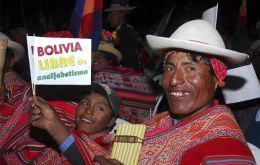MercoPress. South Atlantic News Agency
Latin America
-
Monday, December 29th 2008 - 20:00 UTC
Damien Hirst Mexico vacation with SAS bodyguards
Damien Hirst, the British artist with a personal fortune estimated in excess of 300 million US dollars has hired four personal bodyguards who are all former members of the SAS, British special forces.
-
Monday, December 29th 2008 - 20:00 UTC
Cuba: 2008 worst year since collapse of the Soviet Union
Cuba says it has suffered one of the most difficult financial years since the collapse of the Soviet Union. Economy minister Jose Luis Rodriguez said the Cuban economy had grown by 4.3% in the past year, falling short of the 8% forecast by the government.
President Raul Castro called for austerity measures including cutbacks in official travel and bonuses. -
Monday, December 29th 2008 - 20:00 UTC
IDB increased outlays to Latam 25% to 12.2 billion USD

The Inter-American Development Bank Group increased loan, credit guarantee and grant approvals by about a quarter to a record 12.2 billion US dollars in 2008, in an effort to help Latin America and the Caribbean weather the global financial crisis.
-
Saturday, December 27th 2008 - 20:00 UTC
President Michelle Bachelet Improves in Chile

Public support for Michelle Bachelet has markedly increased in Chile, according to a poll by Ipsos. 56.8 per cent of respondents approve of the Chilean president's performance, up 9.9 points since August.
-
Sunday, December 21st 2008 - 20:00 UTC
Bolivia's Morales declares “free of illiteracy”

President Evo Morales declared Bolivia free of illiteracy on Saturday after a three-year project sponsored by his leftist allies Cuba and Venezuela helped about 820,000 people learn to read and write.
-
Sunday, December 21st 2008 - 20:00 UTC
Latam's six year sustained growth grinds to a halt
After six years of strong performance, Latin American and Caribbean economies will slow considerably next year as the global economic meltdown takes its toll on the region and unemployment rises, a United Nations agency for economic development announced last Friday.
-
Saturday, December 20th 2008 - 20:00 UTC
Oil prices threaten Chavez constitution reform process
Venezuela's National Assembly has given preliminary approval for a constitutional referendum to scrap presidential term limits, which would allow President Hugo Chavez to run for re-election in 2012 and beyond.
-
Saturday, December 20th 2008 - 20:00 UTC
LAN allowed to operate in Ecuador's domestic market
Chile's LAN was granted a two-year concession to operate domestic flights in Ecuador, a top aviation official said on Thursday. The airline's Ecuadorean unit will be allowed to fly local routes to major cities like Guayaquil, Quito and Cuenca.
-
Saturday, December 20th 2008 - 20:00 UTC
Ecuadorean bankers concern about “financial stability”
Members of Ecuador's private banking sector expressed concern Friday that recent government financial decisions and overall policies, together with the global crisis, are putting the country's financial system in jeopardy.
-
Saturday, December 20th 2008 - 20:00 UTC
Unasur initiative not incompatible with OAS, says Rice
United States Secretary of State Condoleezza Rice does not think that the creation of an organization that pools Latin American and Caribbean countries would be a threat or incompatible with for the Organization of American States (OAS).
